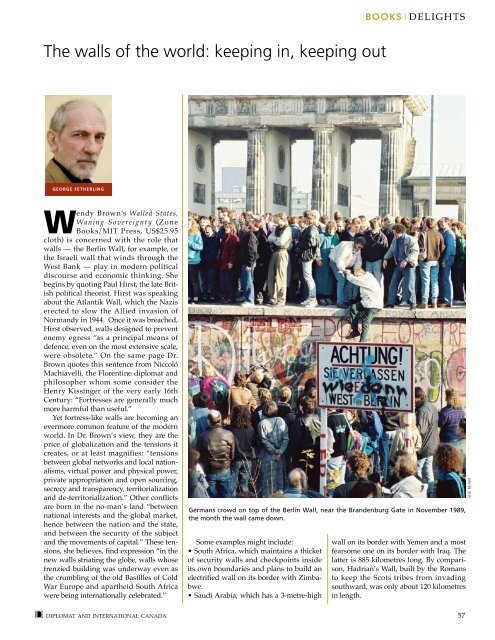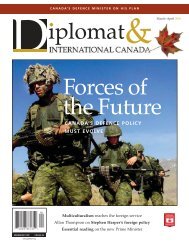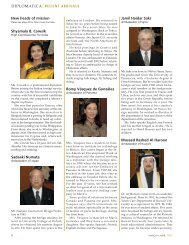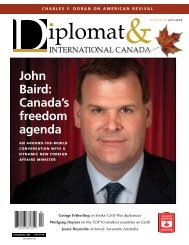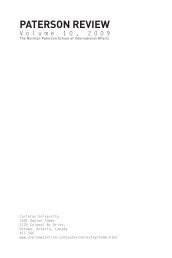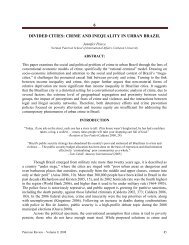the new petro power paradigm - Diplomat Magazine
the new petro power paradigm - Diplomat Magazine
the new petro power paradigm - Diplomat Magazine
Create successful ePaper yourself
Turn your PDF publications into a flip-book with our unique Google optimized e-Paper software.
BOOKS|DELIGHTS<br />
The walls of <strong>the</strong> world: keeping in, keeping out<br />
george fe<strong>the</strong>rling<br />
Wendy Brown’s Walled States,<br />
Waning Sovereignty (Zone<br />
Books/MIT Press, US$25.95<br />
cloth) is concerned with <strong>the</strong> role that<br />
walls — <strong>the</strong> Berlin Wall, for example, or<br />
<strong>the</strong> Israeli wall that winds through <strong>the</strong><br />
West Bank — play in modern political<br />
discourse and economic thinking. She<br />
begins by quoting Paul Hirst, <strong>the</strong> late British<br />
political <strong>the</strong>orist. Hirst was speaking<br />
about <strong>the</strong> Atlantik Wall, which <strong>the</strong> Nazis<br />
erected to slow <strong>the</strong> Allied invasion of<br />
Normandy in 1944. Once it was breached,<br />
Hirst observed, walls designed to prevent<br />
enemy egress “as a principal means of<br />
defence, even on <strong>the</strong> most extensive scale,<br />
were obsolete.” On <strong>the</strong> same page Dr.<br />
Brown quotes this sentence from Niccoló<br />
Machiavelli, <strong>the</strong> Florentine diplomat and<br />
philosopher whom some consider <strong>the</strong><br />
Henry Kissinger of <strong>the</strong> very early 16th<br />
Century: “Fortresses are generally much<br />
more harmful than useful.”<br />
Yet fortress-like walls are becoming an<br />
evermore common feature of <strong>the</strong> modern<br />
world. In Dr. Brown’s view, <strong>the</strong>y are <strong>the</strong><br />
price of globalization and <strong>the</strong> tensions it<br />
creates, or at least magnifies: “tensions<br />
between global networks and local nationalisms,<br />
virtual <strong>power</strong> and physical <strong>power</strong>,<br />
private appropriation and open sourcing,<br />
secrecy and transparency, territorialization<br />
and de-territorialization.” O<strong>the</strong>r conflicts<br />
are born in <strong>the</strong> no-man’s land “between<br />
national interests and <strong>the</strong> global market,<br />
hence between <strong>the</strong> nation and <strong>the</strong> state,<br />
and between <strong>the</strong> security of <strong>the</strong> subject<br />
and <strong>the</strong> movements of capital.” These tensions,<br />
she believes, find expression “in <strong>the</strong><br />
<strong>new</strong> walls striating <strong>the</strong> globe, walls whose<br />
frenzied building was underway even as<br />
<strong>the</strong> crumbling of <strong>the</strong> old Bastilles of Cold<br />
War Europe and apar<strong>the</strong>id South Africa<br />
were being internationally celebrated.”<br />
Germans crowd on top of <strong>the</strong> Berlin Wall, near <strong>the</strong> Brandenburg Gate in November 1989,<br />
<strong>the</strong> month <strong>the</strong> wall came down.<br />
Some examples might include:<br />
• South Africa, which maintains a thicket<br />
of security walls and checkpoints inside<br />
its own boundaries and plans to build an<br />
electrified wall on its border with Zimbabwe.<br />
• Saudi Arabia, which has a 3-metre-high<br />
wall on its border with Yemen and a most<br />
fearsome one on its border with Iraq. The<br />
latter is 885 kilometres long. By comparison,<br />
Hadrian’s Wall, built by <strong>the</strong> Romans<br />
to keep <strong>the</strong> Scots tribes from invading<br />
southward, was only about 120 kilometres<br />
in length.<br />
Sue Ream<br />
diplomat and international canada 57


